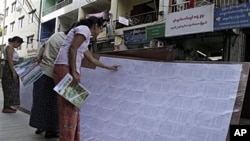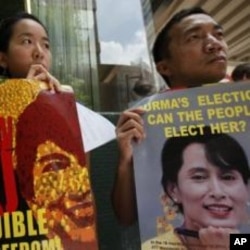As Burma prepares for its first election in 20 years, it is getting strong backing from neighboring China. Regional political analysts say Beijing's goal is ensure stability along its border.
Beijing is one of the few nations endorsing Burma's elections next month.
Burma's military government says the elections, the first in 20 years, are central to its path to democracy and civilian rule. But critics, including the United States, consider the November 7 vote to be flawed and designed to ensure that the military remains in control.
International Crisis Group's report
The International Crisis Group in a recent report said China's top concern is not democracy, but security along the 2,200-kilometer border it shares with Burma.
A year ago, tens of thousands of refugees flooded across the border because of a Burmese military offensive into the mainly ethnic Chinese area of Kokang, in northeast Shan state.
Beijing was forced to deploy its own troops to stabilize the region.
Stephanie Kleine-Ahlbrandt is the Northeast Asia Project director for the International Crisis Group, says Beijing was caught off guard.
"Beijing did not think that the neighbor was really going to go in and undertake a military intervention. And also Beijing was surprised because it was not sufficiently warned by its officials down on the border," she said.
Ahlbrandt says Beijing has since become more closely engaged with General Than Shwe, Burma's leader.
Chinese investment
According to the International Crisis Group's report, this has not changed China's deteriorating image among most people in Burma.
The report says some of China's large energy investments have fostered discontent.
Beijing is Burma's third-biggest trade partner after Thailand and Singapore.
But the report says many Burmese are unhappy with Chinese companies in their country, because of a lack of transparency, disregard for the environment and the unfair distribution of benefits.
In April 2009, three bombs exploded close to a Chinese-built dam in northern Burma's Kachin state.
Some experts in China's foreign relations think the blasts were prompted by resentment toward Chinese businesses.
The role of economy
Zhang Xudong, a professor at the Center for Southeast Asian Studies at Xiamen University, says that the Burmese resentment in the area is a result an economic imbalance.
He says most of the big businesses in Burma are run by Chinese companies and the Burmese rarely reap the benefits from China's vast profits.
Zhang also says many of the Chinese working in Burma are unfamiliar with the local culture.
He thinks this creates misunderstandings, which are further inflamed by the Burmese leadership's policies towards minorities.
Chinese Foreign Ministry spokeswoman Jiang Yu rejected the Crisis Group's findings, saying the trade with Burma benefits both sides equally. Jiang says her government always urges Chinese companies to abide by local laws and regulations, and to pay attention to environmental protection and local traditions.
Critics of Beijing's policy say China believes that its economic interests in Burma depend on stability, especially among ethnic groups in the border areas.
But earlier in September, the sensitive border areas again fell under the spotlight and are worrying Beijing.
Burma's government said it would not set up polling stations in some ethnic communities.
Albrandt says Beijing is now taking a risk by openly supporting the poll.
"At the end of the day this is all a very volatile mix for risk-adverse Beijing," said Albrandt. "I think that China is looking toward elections that can provide legitimacy to these elections and the fact that you do not have ethnic groups participating is going to make that very difficult."
Seat allocation in Burma's parliament
Under Burma's new constitution, 25 percent the seats in parliament are reserved for the military. The country's election laws, announced earlier this year, barred anyone with a criminal conviction from participating in the election, and required political parties to expel members who are in prison or under detention.
That included the National League for Democracy, Burma's major opposition group. Its leader, Aung San Suu Kyi has been under house arrest for most of the past 20 years. The NLD won the country's last elections, in 1990, but the military never allowed it to take power.
The NLD refused to kick out Aung San Suu Kyi and the government said it had to disband.
A United Nations ministerial group recently urged Burma's government to release political detainees, including Aung San Suu Kyi, and to include all groups to make the elections credible. China was part of that group.





